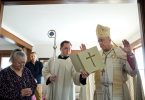‘Vaticanista’ calls Carmelites ‘precious gift to the church’
by Jessica Langdon
jessica.langdon@theleaven.org
LEAVENWORTH — When the topic turns to Pope Francis — and you’ve had a front-row seat for the start of his papacy as John Allen Jr. did — there’s a strong temptation when the opportunity presents itself to simply share great stories.
After all, in his 18 months as pope, Pope Francis has “taken the world by storm,” with incredible popular and media appeal, said Allen, a Kansas native and world-renowned “Vaticanista” who has extensively covered the past three popes.
Now associate editor with The Boston Globe, Allen managed to weave in some stories about Pope Francis for his Kansas audience Oct. 25 while delivering on his promise to also present a reflective message on the future of the Carmelite order and the church.
Allen spoke at a Communion breakfast Oct. 25 at June’s Northland restaurant in Leavenworth.
His presentation was among many highlights of a three-day Sesquicentennial Symposium Oct. 23-25 celebrating the 150th anniversary of the establishment of the first male Carmelite foundation in North America — in Leavenworth.
Father David McEvoy, O.Carm., pastor of Immaculate Conception-St. Joseph Parish in Leavenworth, envisioned this celebration — “Carmel’s Journey to the Frontiers” — that brought together Carmelite priests, Brothers, Sisters and cloistered nuns, as well as many others, to mark this anniversary with a packed agenda.
“Like most Catholics, I have always tremendously admired the Carmelites,” said Allen. “In the church, we often struggle to strike the right balance between deep contemplation and meaningful action, and usually we are on one or the other side of that equation.”
But to him, the Carmelites have always struck a “pitch perfect” balance.
“You are a precious gift to the church,” he said.
In the story-filled and humor-laced presentation, Allen went on to further laud the Carmelites’ contribution to the church.
But he also spoke broadly about Pope Francis and the “three emerging pillars” of his papacy.
Allen illustrated this pope’s attraction to the media, Catholics and the world as a whole with a story from a trip Pope Francis made to a Marian shrine in the summer of 2013 when World Youth Day was held in Rio de Janeiro.
Despite hefty security, throngs of people crammed into the streets, noted Allen, who rode the press bus behind the popemobile.
When the door to the pope’s vehicle opened, a group of Latin American nuns shrieked “like teenaged girls at a Justin Bieber concert,” said Allen, and they took selfies with him.
When Allen asked one of the men charged with preventing scenes like that why he couldn’t do something, the young man in a combat helmet said he was “not going to be the guy caught on YouTube beating up a nun!”
So, here is the way Allen sees it: “There is something so electric about this man that any attempt to bottle it up or fence it in is destined to fail. And most of the time, the better strategy is just not to try,” he said.
Allen sees three pillars coming to the forefront as Pope Francis leads the Catholic Church forward: leadership as service, a deep new missionary concep- tion, and mercy as the core Christian message.
“In the early days, I mean the first 48 to 72 hours after Francis’ election, it was, of course, those gestures of personal simplicity and humility that really first charmed the world,” said Allen.
Declining the papal limousine for the shuttle bus, paying his own bill and packing his own bag, opting out of living in the papal apartment, and calling to cancel his own newspaper subscription in Argentina all said something about this pope, said Allen, as he described the pillar of leadership as service.
“Ladies and gentlemen, never forget that under that humble, simple exterior lies the mind of a brilliant Jesuit politician,” said Allen. “This guy knows what he is doing all the time. There are no accidents. There is nothing casual. This is thought out.”
It sets a tone, said Allen, for what leadership in the church looks like.
“And this is not John Allen’s private journalistic hypothesis,” he said. “Pope Francis has said all of this out loud.”
He cited a now-famous quote from Pope Francis expressing that “we want pastors who carry the smell of their sheep because they are close to the ordinary people they are called to serve.”
And Allen sees that the pope is willing to take action to back up his words.
In covering popes for nearly 20 years, Allen came to understand that being a pope is an impossible job, even without considering what canon law requires.
People expect a pope to act as CEO, intellectual giant, diplomat, politician, media star and living saint, he said.
“Any one of these would be a life’s work,” said Allen.
“I guarantee you in his heart of hearts, Pope Francis thinks of himself fundamentally as a missionary,” he said, explaining the second pillar: a missionary conception in the church.
That missionary spirit is evident in all he does, said Allen. Like when Pope Francis stopped in St. Peter’s Square to embrace a man disfigured by a genetic disorder. Or shared his birthday breakfast with three homeless men and their dog.
Or in the earliest days of his papacy, made a trip to the island of Lampedusa and laid a wreath for the immigrants who had died trying to make their way to a better life in Europe.
Turning to the third pillar — the idea of mercy — Allen suggested Pope Francis’ catch phrase so far might be: “The Lord never tires of forgiving.”
“It is fundamentally a message of mercy,” said Allen.
As the bishop of Rome, Pope Francis surprised the pastor during his first parish visit in May 2013, arriving 45 minutes early because he wanted to hear confessions.
As a minister of the Christian Gospel, Pope Francis knows he must speak on God’s judgment and God’s mercy, said Allen.
“His belief is the world has heard our judgment with crystal clarity, and now it is time for the world to hear and to see and to smell and to taste and to feel our mercy,” he said.






